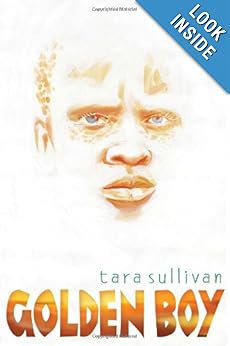“Burning in the daylight and hunted in the shadows, having albinism is often a death sentence in East Africa. In Tanzania, one out of every 1,400 people has albinism, a genetic condition characterized by a lack of pigment in the body. That compares to a global average of one in 20,000 people.” Huffington Post, June 15, 2013.
“In fact, the number of albino murders are decreasing in Tanzania because of all the publicity and the government’s stern warnings that they must stop. But African albinos still grow up in a world of prejudice and misunderstanding.” NPR, All Things Considered, November 30, 2012
“People with albinism in East Africa face profound social stigma and isolation, due to the negative myths that surround the condition. In addition, most children with albinism have early signs of skin cancer by their teen years, and only 2% of people with albinism live to reach their 40th birthday.” Asante Miraimu website.
 Golden Boy, Ms. Sullivan’s debut novel, is the kind of book that impels the reader (at least this reader) to go to the internet and start looking up facts about the problem that is portrayed, in this case the persecution of individuals with albinism. But even without all the fact-finding follow-up, Golden Boy is a good story that highlights the difficulties and sheer pain of growing up and living in a place where you are humiliated and ridiculed and maybe even physically assaulted (or killed) as a result of physical differences. Even those of us who have never been persecuted or made to fear for our lives can identify to some extent with Habo, the albino protagonist of this novel, and his search for significance, his desire to see himself as more than just a zero-zero, the Tanzanian term for albinos.
Golden Boy, Ms. Sullivan’s debut novel, is the kind of book that impels the reader (at least this reader) to go to the internet and start looking up facts about the problem that is portrayed, in this case the persecution of individuals with albinism. But even without all the fact-finding follow-up, Golden Boy is a good story that highlights the difficulties and sheer pain of growing up and living in a place where you are humiliated and ridiculed and maybe even physically assaulted (or killed) as a result of physical differences. Even those of us who have never been persecuted or made to fear for our lives can identify to some extent with Habo, the albino protagonist of this novel, and his search for significance, his desire to see himself as more than just a zero-zero, the Tanzanian term for albinos.
Who hasn’t been made to feel like a zero at sometime by someone? But for for Habo, life is much more dangerous than it is for most people with low self-esteem, and the stakes are much higher than they are in the typical neighborhood bullying incident. People actually do kill albinos in the place where Habo’s family comes to live. And Habo must run away and hide himself, unable to trust anyone. Even the blind sculptor he meets, who doesn’t know about his secret, may become a threat if and when he finds out that Habo is an albino.
Yes, this story has a moral, but it is far from moralistic. Habo feels and acts like a real person, even as he becomes a fictional symbol for all of the children who suffer from the twin afflictions of abuse and physical impairment as a result of their albinism.
Other reviews of Golden Boy:
My Head Is Full of Books: “Golden Boy has just catapulted itself onto my list of top YA books of the year. The topic, living in Africa with albinism, is certainly a unique one. Yes, it is a story about prejudice and the effects of poor education, but it is also a story of acceptance and of bravery.”
Megan Cox Gurdon in WSJ: “This harrowing but ultimately redemptive story benefits from Ms. Sullivan’s deft use of simile: She writes that panic crawls up Habo’s throat ‘like a hairy spider.'”
Abby the Librarian: “an accessible novel with a compelling plot that will interest kids and may inspire them to learn more about the plight of albinos in Tanzania and what they can do to help.”
Wow! Sounds wonderful!
There is a Chinese girl with albinism in my girls’ Bibke study group. I wonder if the same stigma plays out in other cultures. (She is the adopted daughter of American parents.)
Pingback: Baker’s Dozen: 13 Upcoming Children’s Books I Want to Read in 2016 | Semicolon